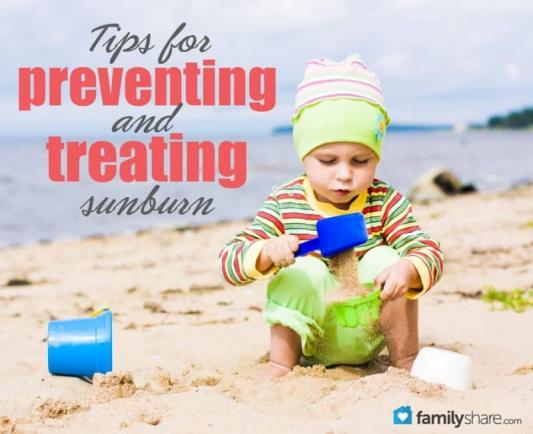
I remember as a child waiting for that first nice burn of the season, knowing that it would later turn into a glowing tan. We never gave a second thought to it. Now, however, we know that even a little pink can have long-term implications. I had several serious, blistering burns and even one case of sun poisoning when I was eleven, and now I live with a watchful eye on several basal cell carcinomas.
Getting sunburned is just not a good idea. It hurts, it wrinkles and it can lead to serious complications even decades down the road. It is especially bad for children. One bad sunburn may double their lifetime risk of melanoma.
Here are some tips for preventing and treating sunburn
1.
Limit your exposure
Sunburns don't always show up right away. It takes 4-6 hours to see the effects of the day's sun. So, if you're already feeling tingly or burned, it's too late. Treat yourself. Use coverings or sunscreens if you are going to be out for any length of time.
2.
Moisturize
A cool shower will soothe the burn. Afterwards, apply a gentle moisturizer. Choosing one with vitamins C and E might reduce the skin damage, according to The Skin Cancer Foundation experts. It's also OK to use a hydrocortisone cream for a day or two to relieve discomfort. However, experts warn against the following: scrubbing, picking or peeling your skin or breaking blisters.
3.
Increase fluid intake
In order to moisturize the burn, the body sends fluids to the skin's surface. This can lead to dehydration - particularly in children. Make certain to get plenty of fluids and watch for these signs of dehydration: Dry mouth, thirst, reduced urination, headache, dizziness and lethargy. If these appear in children, seek medical attention.
4.
Medicate
Take ibuprofen (like Advil) for about 48 hours after a burn to reduce the inflammation and help with pain. Acetaminophen (like Tylenol) will help with pain, but doesn't have anti-inflammatory ingredients.
5.
When to seek medical attention
If a burn is blistered and covers more than 20 percent of your body (for instance, a child's whole back), you may need to see medical attention.
6.
Schedule your time outside
The most dangerous time to be out in the sun is between 10 am and 4 pm. Try to work around that. If you can't, use preventative measures.
7.
An overcast sky is not your friend
Just because it's cloudy does not mean you are safe from the sun's rays. My case of sun poisoning occured when I floated on a raft for several hours on a nice cloudy day. I had a raging fever, headaches, vomiting and could not wear clothing for about a week. I couldn't even stand for the sheets to touch me.
8.
Treat your burn with Becky Lyn's home remedy
Good old-fashioned apple cider vinegar. Spritz yourself liberally. I've always had good luck with this. You smell like a pickle, but the next morning you are virtually burn-free.
What you need to know about sunscreens
1.
Double the number does not mean double the protection
Florida dermatologist, James M. Spencer, MD, offers this advice: "SPF is not a consumer-friendly number. It is logical for someone to think that an SPF of 30 is twice as good as an SPF of 15 and so on. But that is not how it works." An SPF 15 product blocks about 94% of UVB rays; an SPF 30 product blocks 97% of UVB rays; and an SPF 45 product blocks about 98% of rays. "After that, it just gets silly," he says. Sunscreens with higher SPF ratings block slightly more UVB rays, but none offers 100% protection. He recommends SPF 30.
2.
When to apply
Whatever you choose, apply it 30 minutes before going out and at least every two hours during your outing.
3.
How to protect in water
Choose waterproof sunscreen or reapply after swimming or getting wet.
4.
What to avoid
Avoid SPF's which are too high as they also pose a risk for skin irritation. Avoid sunscreens with retinyl palmitate, which one group claims showed higher rates of skin lesions and tumors in various tests. The ingredient is a form of Vitamin A that is used in 30 percent of the sunscreens that were analyzed. Also avoid oxybenzone, a sun-blocking agent that is also a hormone disrupter and skin irritant.
5.
Caring for infants
Infants under 6 months should not be exposed to the sun or sunscreen. Keep them lightly covered. Schedule your walks and outings for before 10 am or after 4 pm.
Summer means more time outdoors with family and that is a good thing. Just remember to protect yourself from pain now and future damage from the sun!

